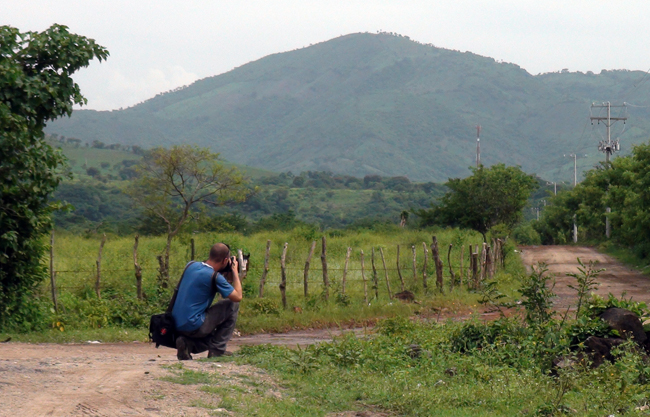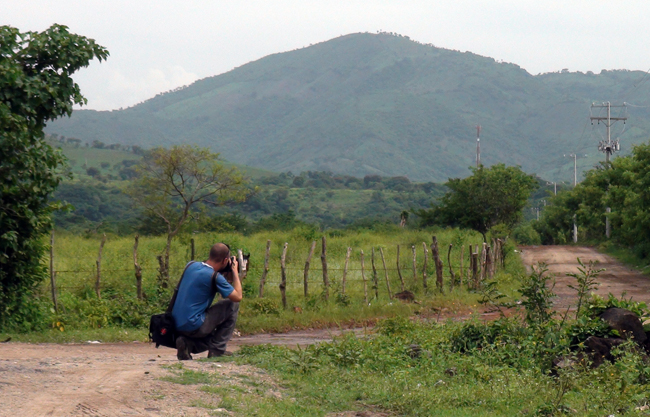
How News21 prepares the next generation of investigative journalists
News21 student journalist Tarryn Mento
See related article in Nieman Journalism Lab by Eric Newton, Senior Adviser to the President: ‘Journalism schools can be leaders in innovation and the news’
The current listeriosis outbreak linked to tainted cantaloupe is the worst foodborne illness outbreak since 1998 – linked to 21 deaths in 11 states and an additional 109 infections in 24 states, the Center for Disease Control and Prevention has found.
Although the current listeriosis outbreak began in July, the issue of bacteria and food safety is an ongoing problem.
Tarryn Mento and Brandon Quester, National Project Fellows at the News21 program at Arizona State University, spent several months researching the implications of food safety, and traveled to Guatemala to investigate the site of a farm allegedly at the center of an earlier cantaloupe outbreak that caused 20 people to fall ill, including three who ate salmonella-tainted melons at an Oregon church dinner in February.
Their efforts resulted in the article “Salmonella Outbreak Traced to Cantaloupes in Guatemala.” The piece raises significant questions about how foodborne illness and outbreaks are investigated in the U.S. – and the steps authorities may or may not be taking to prevent them from occurring.
News21’s research has informed the mainstream media’s coverage of food safety over the past several weeks, with MSNBC.com and the Washington Post publishing News21’s reporting.
Mento and Quester recently answered questions about their experience researching the cantaloupe outbreak and the larger context of how News21 is preparing the next generation of investigative journalists.
Q: Each year, students in the News21 program study a topic in-depth during a spring seminar and follow it up with a 10-week reporting fellowship during the summer. This year, the topic was food safety. What was the overall process of investigating food safety like?
B.Q: What we found in doing our research is that there is a massive influx of foreign food being imported into the U.S., which unfortunately is being inspected at a rate of less than two percent. The News21 program allowed us to document that story and frame the context of where your food is coming from and how safe it is. As we progressed throughout late summer and early fall, we realized that we had in-depth reporting that nobody else in the country had; that elevated our ability to tell the story.
T.M: Beyond investigating the issue of food safety, the project really allowed us to gain a full understanding, from the beginning to end, as to how the investigation process works for journalists. For example, the information we gained over the phone prior to our trip to Guatemela was not as in-depth as being able to be down there and actually talking to people. The trip itself was hugely beneficial in that way. It also showed that we were taking the story seriously as journalists.
Q: As your project on food safety and the cantaloupe outbreak developed, what did you find most surprising?
B.Q: What surprised me was how the overall system of food safety works. In the beginning, it didn’t appear too problematic, but all it took was a little bit of good reporting to find what turned out to be a great story. Through our research, we were able to point to broader implications in food safety, including the struggle of the Food and Drug Administration to regulate imported food.
T.M: As the investigation progressed, I was simply shocked at the amount of steps it takes to get food from a farm in Guatemala to a household in the U.S. The exchange of hands that food goes through to get from one place to another is incredibly more complicated than anything I had ever imagined.
Q: That may seem scary to American consumers who don’t know where their food comes from or whether it’s safe.
B.Q: Absolutely, but it was true for the entire food safety project, not just our research on cantaloupes. The scope and the breadth of food coming into the U.S. is incredible, there are so many different points at which food can be contaminated, if you miss one of those steps you can have a serious outbreak on your hands.
Q: To follow the outbreak you traveled to a Del Monte farm four hours from Guatemala City that allegedly was responsible for sickening more than 20 people in 10 states. Tell me about your trip. What was it like to do an investigation that took place partly in another country?
B.Q: It was a great opportunity as a young journalist to do an investigative piece that had such wide-ranging implications as this one did. But the experience of traveling to and reporting in a foreign country definitely presented significant challenges. We were dealing with language and cultural barriers, not to mention the fact that Guatemala has different ideas about freedom of the press. Still, I’m grateful for the chance to do what we did, many young reporters don’t get that opportunity.
T.M: I agree, the trip itself was definitely a challenge, we spent weeks setting it up, scheduling interviews with various officials and mapping out where we wanted to go. We knew we were going to be there for a limited time and that we were going to need assistance with translation. When things did not go according to our plan, which was often, it taught us to adapt to the situation. It was a great opportunity to be flexible and forced us to think on our feet.
Q: Looking back on the entire experience, what was your biggest feeling of accomplishment?
B.Q: My biggest feeling of accomplishment comes from the fact that I had the opportunity and ability to produce a viable piece of investigative journalism. At a time when newsrooms are shrinking and budgets are minimized, the chance to do true accountability journalism is not what it used to be. I also get satisfaction because I know this experience benefits the public at large because now we’re part of a new generation of journalists that know how to do investigative journalism. The experience itself is as critical to any outcome from stories that the program produced.
T.M: For me, it came together with the completion of the article. To have the opportunity to see it finally published was very fulfilling. Because the story took so long to produce and went through so many versions, when I finally saw it come together, I felt really proud. I agree with Brandon, having this information be shared with the public made it worth all the challenges we faced to produce it.
Q: What specific aspects of the News21 program do you think helped you produce such a good story?
B.Q: The breadth of resources available to allow us to do the report was incredible. We also had the opportunity to work with established professional editors such as Leonard Downie Jr, Sharon Rosenhause, the former managing editor of the South Florida Sun-Sentinel and longtime digital journalist Jody Bannon, the director of the News21 program. Also Cronkite Associate Dean Kristin Gilbert who provided oversight to all of the fellows as we worked on the project. The quality of people associated with the program is truly one of its greatest strengths.
Q: How did this this experience prepare you for future work as a journalist?
B.Q: The experience illustrated the entire journalistic process, how reporting does not involve just a simple phone call, but it requires you to dig deep. Through interviews, submitting Freedom of Information Act Requests and following paper trails and e-mails, we were able to see the whole picture that was not immediately evident during initial reporting. We then had the chance to glean information from that process and once we took the time to make sure we fully understood it, we could relay it to the public.
T.M: I completely agree. I also learned how to identify barriers and how to overcome them. Especially while Guatemala, I learned how to trouble-shoot when things didn’t go our way. We had to be resourceful and find alternative ways to get information. I really learned how critical having access to information is when doing an investigative report like this one.

News21 student journalist Brandon Quester
The gallery of photos Quester took as part of the investigation at the Fresh Del Monte Produce farm in Guatemala are available as part of the report.
News21 is a program of the Carnegie Corporation of New York and Knight Foundation to foster in-depth, interactive and innovative investigative journalism at journalism schools across the country. It is headquartered at the Walter Cronkite School of Journalism and Mass Communication at Arizona State University. In 2012, News 21 will expand to include other journalism schools around the country.
Recent Content
-
Journalismarticle ·
-
Journalismarticle ·
-
Journalismarticle ·



